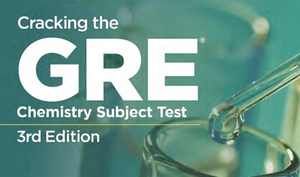By Alayna Johnson, 2019-2020 SCS Student Advising Leader:
After you’ve completed the chemistry curriculum, taken the general GRE, made connections with professors across campus, and maybe even completed an internship or two, you may think your graduate application package is complete. Unfortunately, there may be a final step: the GRE chemistry subject test. This is a 3-hour, multiple-choice, paper test that some students choose to take to further demonstrate their aptitude in chemistry. I took the exam last April and wanted to share my experiences and tips for a successful test-taking experience. Before that, let’s take a look at some quick facts:
- The test is only offered three times each year (April, September, and October)
- The cost of the exam is $150
- Only a small number of chemistry graduate programs explicitly require the subject test; many strongly recommend it, and many don’t require it at all. Research the programs you’re most interested in and see if it’s needed.
- Recently, the testing centers on and near the University of Illinois campus stopped offering all subject tests. Thus, you may have to travel to take your test; I took mine in Decatur, IL.
- The test covers the following subjects: analytical chemistry (~15%), inorganic chemistry (~25%), organic chemistry (~30%), and physical chemistry (~30%)
Timeline and Preparation:
Since the test is only offered three times a year and far from campus, it’s important to plan ahead. I found a test location, registered for the test, and arranged for a ride to Decatur about six months in advance. Over the next few months, I searched online for study materials and student accounts of the exam.
I have found that April of junior year is the best time to take the exam. Any earlier, you may be lacking some of the required chemistry background; any later, you may not have enough time to retake the exam if needed.
Studying:
I found that the best way to study for the test is to complete past exams. Educational Testing Services (ETS, the company that administers the exam) offers a free practice exam upon registration, which is a fabulous resource. You may be able to track down more exams by searching online or talking to older students. There are some study books available for purchase, but most have all one- or two-star reviews and are riddled with mistakes.
Since I took the exam in April, I studied over winter break, throughout the spring semester, and over spring break. I carefully went through each question on the past exams, noting any question I was unfamiliar with or answered incorrectly. I used those results to compile a study guide and a list of must-know equations. I saved a few exams to take under test-taking conditions to make sure I could complete it in the allotted time. In the two weeks before the exam, I memorized and reviewed all of the information on the study guide.
Post-test and results:
Scores are released about a month after the exam. Few, if any schools, publish minimum or average subject test scores required for admission, so it’s difficult to know what constitutes a good score. However, it’s generally accepted that the subject test is one of the least important parts of your graduate application package. Students have been admitted to top chemistry graduate programs with scores below the 50th percentile. In other words, don’t be too hard on yourself if you didn’t score as well as you’d hoped to.
